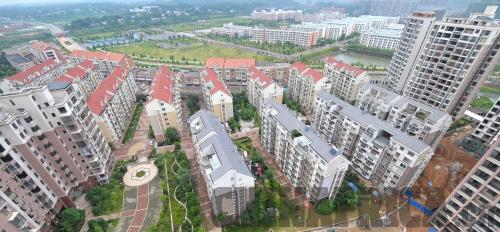| 
The latest edition of the World Economic Forum's Global Competitiveness Report sees a decline in the rankings for China, from 26th to 29th in the Global Competitiveness Index. China's competitiveness ranking dropped for the first time since 2005. The drop reflects the global economic downturn and exports under pressure from recession. And, there are many negative effects after the government's rescue operation in 2008, including a rise in inflationary pressure, higher real estate prices and bad debt levels resulting from asset bubble risks, businesses bankruptcy, and a decline in imports and exports.
The economic slowdown is hiding behind the negative trends. China's economy appears to be slowing more than expected, so that many overseas research institutions expected to see serious economic problems in the country. Accordingly, China's competitiveness drops in this year's global ranking. Since this May the Chinese Government has announced a series of policies to stimulate economic growth, including the reversal in the monetary policy, repeated bank reserve requirement ratio cutting, asymmetric cut of interest rate twice, and a record amount of liquidity into the money market through its open market operation. Meanwhile, the government also accelerated the approval of some infrastructure projects, promoted consumption of energy-saving home appliances in vast rural areas and increased tax cuts on enterprises, but the economic stimulus measures did not achieve expected results of ensuring steady growth.
The latest data from the National Bureau of Statistics show the world's second largest economy is facing growing downturn pressures, as indicated by further deceleration in growth of manufacturing Purchasing Managers' Index (PMI), Producer Price Index (PPI) and import and export volumes.
What are prospects for China's economy? How does the stimulus policy affect economic growth? What are the reasons behind the country's economic slowdown?
A latest Bloomberg News poll of 847 investors, analysts and traders shows, global investors are losing faith in China. About a quarter of those surveyed say they expect Chinese markets to be among the worst performers over the next year. That's the highest negative reading that the country has received in the quarterly Bloomberg Global Poll since 2010. That is different from the second half of the 2008 when China was regarded as the locomotive of the world economic recovery.
Domestic and overseas investors are losing faith in China, given that the V-shape rebound for China's economy in the second half of 2008 had a lingering negative impact on the country's economic growth. In the context of complicated and changed economic situations, the government should maintain its housing market regulations and its efforts to push for national economic transformation through extricating the fast-growing economy from dependence on the housing market.
In the transition period, there is overcapacity in a host of industries, followed by enterprises' bankruptcy and deficits, growth in bad loans and inflationary pressures. In this case, if the Chinese Government adopted traditional fiscal and monetary policy, it may arouse the concern that those speculators have returned to the market to fuel further rise in housing prices. Over the past years, the expansion in real estate attracted further investment from related domestic enterprises, and fueled their rapid growth as well. The economic growth heavily dependent on housing investment is completely unsustainable.
 |
|
BUILDING STABILITY: China remains the most competitive of the world's emerging markets |
Unsold real estate inventories in China have been rising steadily in the first half of this year, and because of this, the overcapacity issue has again come to the fore in several industries in China including iron and steel, cement, building materials, coal, and electricity, and infiltrated both upstream and downstream channels. Under the background of severe overcapacity, PPI dropped to a 34-month low.
The government may further increase investment in infrastructure that could promote the growth in fixed assets investment and stimulate the overall economic growth. Infrastructure investment is a good channel for absorbing domestic overcapacity, but it is still a top-down approach led by the government.
In order to achieve the goal, the government needs to speed up the elimination of backward production capacity through market-oriented, bottom-up approach. The huge potential for housing demand in China has to be fully tapped when the country is being constrained by weak external demand. So the country should adjust its housing policy in order to return property prices to a reasonable level, and adopt long-term affordable housing strategies in the housing market. In this way, China's economy will continue to maintain steady and rapid growth and its competitiveness will be enhanced as well.
As the Global Competitiveness Report shows, China is clearly the most competitive of the large emerging markets. There has been a mild deceleration, but China is still a key driving force in the world economy. Urbanization, industrialization, marketization, and internationalization will no doubt drive the long-term stable and rapid development of China's economy.
(The author is researcher with the Institute of Finance and Banking under the Chinese Academy of Social Sciences)
|